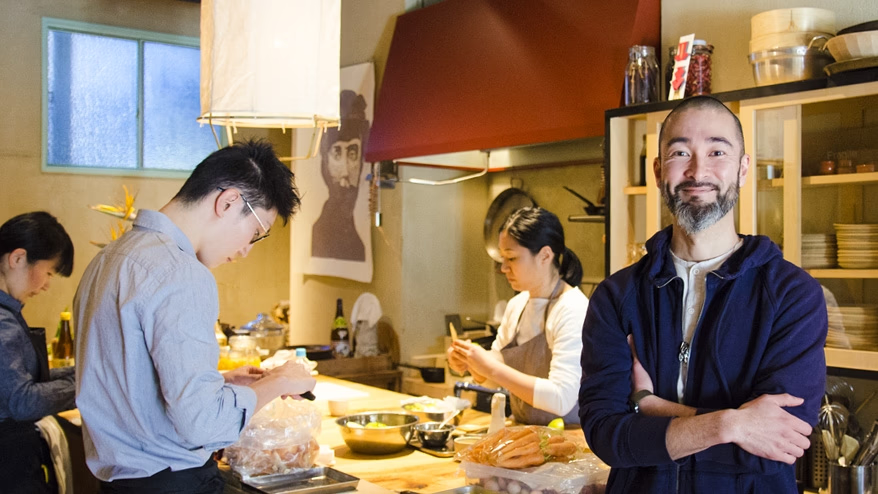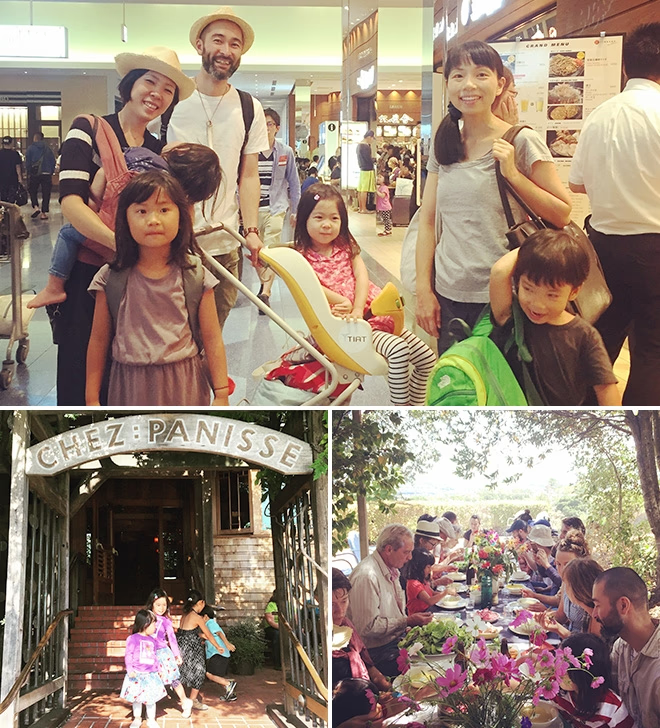This episode of Meguru Measuring Ruler is presented in two parts.
Our guest, Shinichiro Harakawa, opened the restaurant "The Blind Donkey" in December 2017 together with Jerome Waag, former executive chef of the California organic restaurant "Chez Panisse ," which has been fostering a culture and community of local production and consumption since the 1970s.
In the first part , we talked to Harakawa about the process of discovering "truly delicious food" from the food event " Openhervest ," which could be said to have changed the two of their lives. "The Blind Donkey" collects ingredients from producers all over the country, including the Food Hub Project , and Jerome uses his skills to provide seasonal flavors.
Why did he decide to close the restaurant where he was the owner and chef to start "The Blind Donkey"? Our conversation with Manabe, the head of the production department with whom he has a close relationship, continues.
(Interviewer: Kensaku Saguchi)
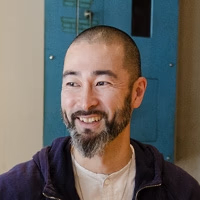
Profile of Shinichiro Harakawa :
Co-representative of RichSoil & Co. After working at a bistro in Tokyo, he traveled to France in 2008 and trained at the two-star restaurant La Madeleine. After returning to Japan, he worked as a chef at the natural wine cafe Uguisu in Sangenjaya, and in 2012 opened the travel-themed restaurant BEARD. At the end of last year, he started the restaurant the Blind Donkey with Jerome Waag, former executive chef of the organic restaurant Chez Panisse in California, with the aim of making Japan 100% organic. Jerome uses his skills to provide seasonal flavors using ingredients collected from producers around the country.
When you see the chef in focus,
I feel a sense of incongruity, wondering where the producers are.
Manabe
How long did it take after BEARD closed for the Blind Donkey to open?
Harakawa
It's been about two years.
Manabe
Two years!
Harakawa
It's been three years since Jerome and I said, "Let's do this seriously."
Manabe : First of all, who asked the other out first?
Harakawa: He had thought that if he were to leave "Chez Panisse," now would be the right time, and we had been talking about how "Even if I went out and opened my own restaurant, there are already so many restaurants in California, it wouldn't be much fun," so he asked me if there was a possibility that I might open a restaurant in Tokyo.
Of course, there are many good restaurants in Tokyo, but as far as I know, there is no one who is operating with the same mindset as him. So, I said to him, if Jerome is serious about this, I'll quit my job and we'll work together.
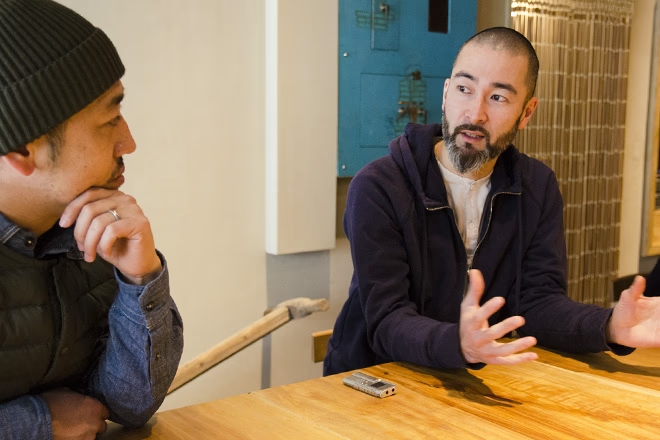
Manabe: What kind of restaurant did you discuss opening?
The concept of Harakawa-san's restaurant is very simple: to get closer to nature and eat seasonal foods. The people who connect us to this are the producers of food, the farmers and fishermen. We want to support farmers who get closer to nature through cooking and eating the food we eat.
Manabe
Now that I'm living in the countryside and close to fields, I sometimes think that Japanese people may have even forgotten what it means for their bodies to feel truly delicious.
Harakawa
It's like our sense of what is "delicious" is misaligned. But food is really popular these days, isn't it? Chefs are treated like rock stars...
Manabe: This tendency is especially prevalent overseas.
Harakawa
When I see the focus on the chef, I feel a strange feeling and wonder, "Where are the producers?" It is only because of the producers who grow the ingredients while facing harsh weather and nature that the food can be served.
A chef who is in the spotlight orders "just 50 small turnips please" as if that's the most natural thing to do. I thought that was strange. I want to shine the spotlight on the people who make the food and serve it. Since I started thinking that way, I've found the changes in myself to be interesting.
Manabe: How have things changed?
Harakawa: I no longer feel any sense of anxiety, and my view of the world has changed completely.
Manabe: What kind of anxiety? You're not the type to show your anxiety very much.
Harakawa
When I started "BEARD", somewhere in my heart I thought "If I don't get attention as a chef, the restaurant won't last". I set trends for myself, now Mexican, next Arab, next Chinese. That's how I thought I had to create and disseminate new things.
So something like that happened to Manabe Makoto too.
Harakawa-san thought that if he wasn't constantly chasing something, he wouldn't be able to continue.
Manabe: So that has changed since you started OPENharvest and Nomadic Kitchen.
Harakawa
If that happens, then it'll be the Earth next...
Manabe Chikyu! This is getting big again (laughs).
Harakawa: Yes, your perspective is on the planet (laughs). If you start thinking about what you can do to make the planet a better place, and don't care about trends or attracting attention, then there's no end to it.
The Blind Donkey's vision
What does it mean to "make Japan 100% organic"?
Manabe: Does what you're saying now relate to the vision set out for "the Blind Donkey"?
Harakawa
Jerome and Fifty Fifty started RichSoil&Co. in order to realize our vision of "making Japan 100% organic." The name RichSoil was chosen with the idea of respecting diversity and creating rich soil. As a company, we want to interact with farmers, fishermen, and many other people.
This is because farmers and fishermen who produce delicious vegetables are indispensable for cooking. At the same time, we must recognize that we cannot survive on Earth without nature, and we must look at nature from a human perspective.
When I was talking about how I wanted to convey this message through food, a friend gave me some advice: "It's hard to understand, so you might as well just say it simply, like 'Make Japan 100% organic.'"
Manabe is good. You can also think about what percentage it is now. By the way, I think most people reading this article have never tried the food at "The Blind Donkey", so could you tell me what kind of menu they serve?
Harakawa: It's difficult to put into words, but Jerome's food has a rich, nutritious taste. It seeps into your mouth and sometimes, at random times, you'll remember, "That dish from back then was really good." It's not the kind of food that leaves an impact when you take a bite, but the taste that makes you feel it's delicious without any stress.
I think that's necessary and what's wanted. That kind of taste. Food that stays in your memory and you remember over time. Right now, I feel like I'm following Jerome's way of making those kinds of dishes.
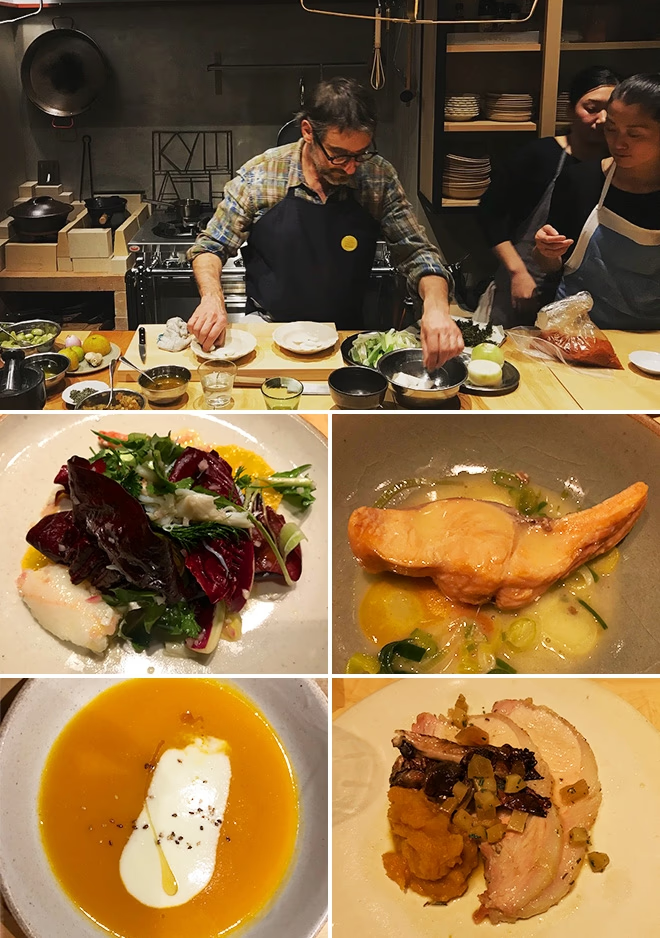
Jerome in action in The Blind Donkey's kitchen, cooking with Jerome
Manabe : I think Shin-chan's fans are feeling a little lonely too.
Harakawa: I'm happy when everyone asks me, "Why don't you cook?" but I don't think, "I have to do it myself." I want everyone to eat Jerome's food, and he brings out the flavor of "Chez Panisse" and his own flavor on top of that. I can't bring out that feeling.
Manabe : You also buy ingredients directly from producers in various regions, right? The ingredients available will change depending on the season, and if there is a delay in transportation due to heavy snowfall like today (public transportation was paralyzed due to heavy snowfall in the Hokuriku region), there will be problems with ingredients not arriving as planned. Does Jerome think about the menu after all the ingredients are gathered?
Harakawa: I think it was a very challenging environment for Jerome. Chez Panisse is a rich environment with a tradition of local production and consumption, so he must have been able to cook while selecting the best ingredients.
However, with the difference in environment and the issue of communication between Japanese and English, for example, "I'd like to use turnips next week," "The Food Hub has some turnips," "Okay, have them sent over," and Jerome would think about what to make, saying, "The turnips will arrive soon."
But there are so many times when the turnips that Jerome imagined were completely different from the ones he actually received. So he adjusts by saying, "Okay, so I wanted to make this, but the materials are like this, so I'll do it like this."
Manabe : Even when comparing ingredients in California and Japan, the taste is completely different. Japanese vegetables tend to be sweeter, and the texture is also quite soft and fluffy. There is a chef from America visiting Kamiyama right now, and he says it's completely different.
Harakawa
This is only natural given the difference in climate, and you won't know until you receive it.
Manabe
Do you have a set menu, and instead of "50 small turnips" like the previous example, you have to use these ingredients, so you look for something different? Or do you change the menu to match the taste of the ingredients that arrive? This is a very different approach. Many chefs prefer to choose ingredients according to the taste they want to put out. There aren't many chefs who have the flexibility that Jerome has. The basic attitude towards ingredients is clearly different.
Harakawa: We like to get closer to nature and come up with menu ideas based on what vegetables and fish are available at the moment, and then make dishes that our customers can enjoy.
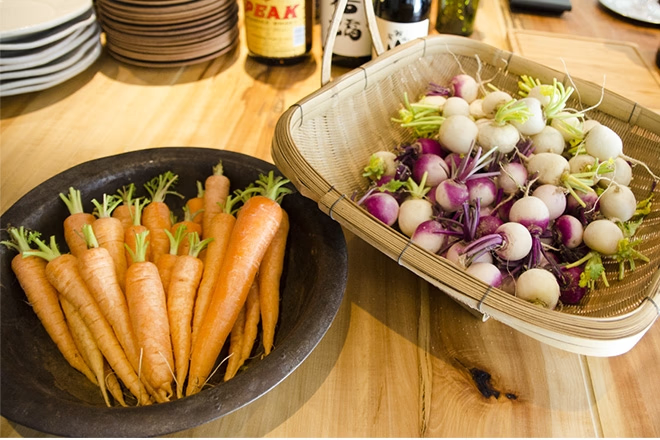
On the day of the interview, vegetables had arrived from a farmer in Kyushu.
Manabe : I completely agree, but it must be difficult to gather ingredients without going through the big markets, right?
Harakawa
No, it's really hard (laughs).
We are working on this as something we want to do and something we should do, but how can we spread it to other people? Every week, we call the producers who are cooperating with us, get a list of the ingredients they have, compile them, and discuss with Jerome and the staff what to do. We contact the producers and ask them to send us this.
I don't really mind because I've been doing it for a long time, but for people who say, "I'm just starting out," it must be tough.
Manabe : It's definitely difficult. It's extremely inefficient.
Because it's Mr. Harakawa , I think that we first need to get "the Blind Donkey" on track, have the staff who grew up here go out and spread our own ways...and without doing things like that, we won't be able to make "Japan 100% organic" a reality.
I do feel a different kind of urgency. When I tell Jerome, "Jerome, we have to get out quickly, we don't have much time," he says, "Well, wait a minute. It took 40 years for 'Chez Panisse' to happen," and soothes me, saying, "It can't be done that quickly" (laughs).
I'm quite impatient, so I always feel like I have to do things quickly.
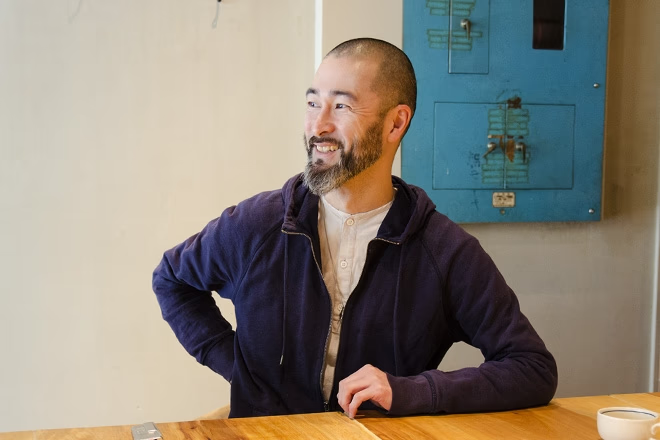
Manabe: We have to move on to the next step...
Harakawa
The Earth won't wait, and there's no time. That's the sense of urgency.
I feel like I can see new ideas starting to sprout here and there. I want to get everyone excited as soon as possible. But I only have one body. There's no point in being too hasty, and I know that if I don't do it right, it'll all be for nothing.
Because I can do my job properly,
It creates a relaxed and welcoming atmosphere
Because it is Mr. Harakawa , he believes that "The Blind Donkey" is more than just a restaurant. He wants to make it a place for everyone.
Manabe: What about everyone?
Harakawa: The customers, the producers, the other people who support us, and the people who work here. I want to say to the producers, "Without you, we wouldn't be able to open the store today. So thank you," and when I ask them for something, I want to remember to be grateful and to be with them, and I think that will make them happy. Then, I think they will take notice of the place and feel that they are participating.
I feel the same way about the customers and the people who work there. I'm also interested in Manabe's Food Hub, so I would like to go to Kamiyama to help out if there is anything, and I want to spread the word. I want to use this store as a base to expand that circle and create a good atmosphere.
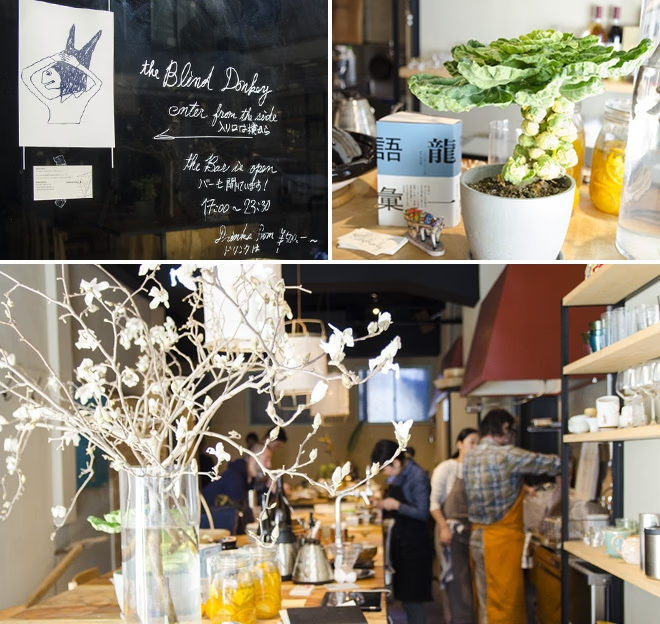
Manabe :I see.
Harakawa: By doing so, we can concentrate more on our work and do it with meaning and significance. If we don't keep learning, keep connecting, and keep interacting properly, "The Blind Donkey" will just be a store. That's not right.
When you go to "Chez Panisse," you feel a great welcome. Even for first-time customers, they are open to the idea that "this is a store for everyone." We want to continue doing our best to become more like that.
Manabe : It's true that even if you go to a restaurant run by people who have graduated from "Chez Panisse," there's always a welcoming atmosphere, and they accept you like you're family. There's no awkwardness, they show you the inside of the kitchen, and they greet you with a "Come on, come on. I'll show you around." That's not because they know each other, but it's the same for everyone.
Harakawa
I think they are truly professionals. You can't accept someone like that just with feelings. Each person has to have the time and space to do it. They can do their jobs properly, so they have the time and space to do it. I don't think they can create that kind of atmosphere unless everyone becomes fully-fledged. They are really amazing. They have accumulated experience, and that experience is being passed on as a baton.
Manabe : I see. So the order is that you are professional in your work and can do it perfectly, so you have more room to maneuver and are able to respond warmly. I get it.
Harakawa: Because there are seniors like that, the young people can learn by watching them and naturally become able to do it. If you are too busy with the work in front of you, when a customer comes in, you will not be able to smile from your heart even if you look up.
Manabe
I don't cook, and I'm not really involved in the production site, so I guess I need to be more thorough about how I create an environment where professionals can work in a professional manner.
Harakawa: In that sense, I also feel that there is still a long way to go.
- Finally, what does Manabe mean to you, Harakawa-san, whose life was changed by OPENharvest?
Manabe
I want to hear it (lol).
Harakawa
Manabe-san is a man of his word. Once he decides to do something, he does it. I really like that about him.
Now that I've started the Food Hub Project in Kamiyama and am continuing with it, he's been a great encouragement to me. He's like a comrade. I think of him that way, though.
Manabe
That's nice.
Harakawa
We support each other, and I think we'll be friends forever. When I hear their stories, I feel like I have to work hard too, and I can empathize with them because we're seeing the same scenery, and I wonder, "What are they doing now? What are they doing? Are they doing well?" That's what they're like.
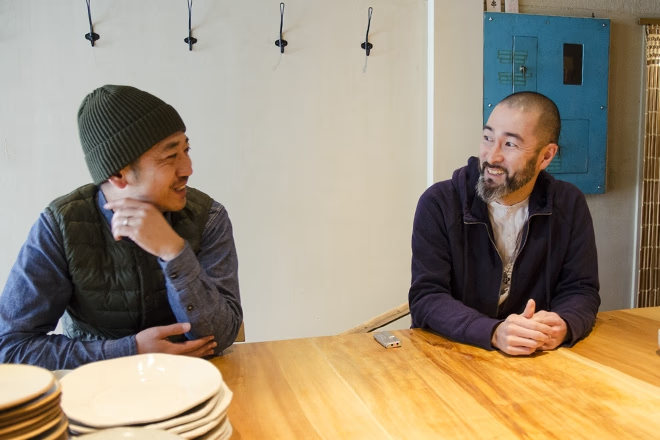
Once again, I feel jealous of Shin-chan.
When I first started Nomadic Kitchen,
To be honest, there was a time when I was annoyed with Shin-chan (laughs).Especially when traveling in Shikoku.
As the person coordinating the trip, I want the chefs to have the best possible experience, so I spend a lot of time (sometimes up to 3 years) building relationships of trust with the producers in advance. At one of those times, at a dinner party with the local people who were helping us, they suddenly asked me, "Why are you doing Nomadic?" and I thought, "What?! Aren't we doing it together?" and I had to explain it in front of everyone, sweating... I would miss my flight right at the beginning of the trip...
Then, Jerome and I decided to open a restaurant in Tokyo.
Although I should have been happy, at the time I was actually feeling extremely jealous.Now, that is not the case at all, and we are irreplaceable friends and comrades who support our activities at the Food Hub Project in Kamiyama from Tokyo, thanks to Shin-chan's strong passion and tolerance. I would like to do anything I can for Jerome and Shin-chan. To be honest, when I think back to those days, I feel small and embarrassed.
This was one story that really made an impression on me during this interview.
When you go to "Chez Panisse," you feel very welcome. Even for first-time customers, they are open to the idea that "this is a restaurant for everyone." That kind of welcoming attitude can't be achieved with just feelings. I think that the atmosphere wouldn't be like that if everyone was comfortable and relaxed.
They are truly amazing, aren't they? They have accumulated a wealth of experience, which they have been passing on to others like a baton.This person has a clear vision of the "essence" of things.
"The Blind Donkey," which Shin-chan launched with Jerome, already exudes that "atmosphere." That's because Shin-chan himself is a professional and has a lot of free time. It's an indescribable, uniquely Shin-chan tolerance. That's the thing I'm least able to do, so maybe that's why I'm "jealous" again lol
Recently, Food Hub has been receiving a flurry of interview requests from several fantastic magazines.
I thought something was strange, so I asked him about it, and he told me that he has been telling various people about the Food Hub and spreading the word. He also serves the Awa Bancha tea we made last year at his restaurant, and he regularly purchases vegetables for the restaurant. It's not like it's some kind of event, but he's sincerely supporting our "daily lives."
It's been about six years since I met Shin-chan. I no longer live in Tokyo, and Shin-chan no longer cooks, but we are more committed to each other than ever before when it comes to food. The environment is completely different from when we first met, but I hope that through the activities of Monosus and Food Hub, I can play a part in the grand mission of "making Japan 100% organic."
2015: The Harakawa and Manabe families take a family trip to CaliforniaWe look forward to your continued support for our entire family in the future.
Taichi Manabe
